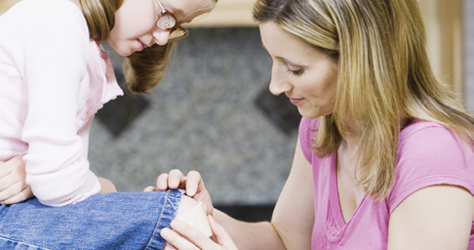First aid sounds complicated, but it’s actually very straightforward
Getting clued up about first aid is easier than it sounds – and you could save your child’s life. Here’s what to put in your family’s first aid kit.
At a glance
- Getting clued up about first aid could save your child's life
- Make sure you have a decent first aid kit which is all in date
- Around 900 people die from choking every year which could be avoided if more people knew what to do

"First aid sounds complicated, but it’s actually very straightforward", says trainer Clive James from St John Ambulance.
All parents should learn the basics: how to check for breathing and resuscitate someone, how to deal with burns and bleeding, and what to do if someone chokes.
Would you know what to do if your child was choking?
A survey by the charity found that a third of parents had experienced a situation where their child was choking – but half of them didn't know what to do.
These NHS guidelines are what you need to follow if your child started to choke:
- If you can see what's stuck, try to grab it but don’t poke around repeatedly with your fingers if you can't see it. It could push the object further in and make it harder to get out.
- If they are coughing loudly, don't do anything. Encourage them to keep coughing and stay with them.
- If coughing is not helping (it’s silent or they can’t breathe in properly), shout for help immediately and assess whether they’re still conscious.
- If your baby is still conscious, but they’re either not coughing or their coughing is not effective, try back blows.
If your child falls unconscious dial 999 immediately.
Watching a child choke is terrifying, but it’s very easy to deal with. “Treatment for choking is so simple, it’s hard to understand why more parents don’t know what to do,” says Clive. "If more people knew, almost no-one would ever die from choking. As it is, 900 people die every year."
First aid guides and courses
St John Ambulance estimates that 140,000 people die in the UK every year in situations where their lives would have been saved if somebody had known first aid.
So, take some time to read our guide to first aid for babies, toddlers and pre-schoolers.
Then book yourself on a first aid course. See St John Ambulance to find one near you.
First aid kits
Make sure your home a decent first aid kit. You can buy a ready-made one, but you don’t have to do that. It’s sometimes better to assemble it yourself because you’ll know what’s in there.
“The danger of buying a ready-made kit is that you’ll put it straight in a drawer in the kitchen or in the car without checking you know how to use all the products,” says Clive.
If you opt for a home-assembled one, store it in an airtight container and check the contents regularly for use-by dates.
St John Ambulance recommends the following kit:
- Plasters (including plenty of big ones)
- A selection of sterile dressings to place over wounds
- Roller bandages to secure those dressings in place
- Adhesive tape to secure bandages in position
- A big triangular bandage to make a sling (if it’s sterile you could also use it as a dressing for a large wound or burn)
- Disposable gloves to prevent infection
- Scissors
- Gauze pads to be used as cleaning swabs or dressings
- Instant ice packs for sprains or bumps (one-use only; they get cold when squeezed)
- Sachets of children’s paracetamol or ibuprofen
- Paracetamol and aspirin for adults.
Clive thinks every family should also have a first aid manual; keep it next to your kit. The most comprehensive is First Aid Manual, published by DK (10th edition), priced £13.99 and co-authored by St John Ambulance, St Andrew’s First Aid and the British Red Cross.